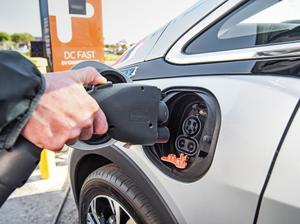
Dexter Turner, an engineer by education and trade, started thinking deeply about electric vehicle charging more than a decade ago when he contemplated converting his wife’s Prius into a plug-in, a variation on the popular hybrid that Toyota hadn’t yet introduced.
“Researching that DIY project really got me looking at EVs and EV charging and I decided this is the next big thing that I want to do, the place where I want to try to have an impact,” Turner said.
That led to OpConnect. The company this year raised around $2.4 million in a seed funding round led by Boston-based Reinventure Capital, and appears to be hitting its stride. Among the new backers is Portland-based VertueLab, which on Monday announced it had invested a total of $600,000 in three cleantech ventures from its Climate Impact Fund. (Portland Seed Fund is another OpConnect investor.)
We talked with Turner about what his startup does and the progress it’s made. The interview has been edited lightly for brevity and clarity.
What does OpConnect sell and who does it sell it to? We sell electric vehicle charging systems and I say systems because it’s more than just the charging station. It’s also software services kind of all rolled into a complete package. And we sell to commercial customers. We don’t sell chargers for the single-family home garage. The industries that we have come to specialize in the last couple of years have been multifamily properties — so apartments and condominiums — and fleets.
With residential installations, do your customers see this as a supplementary revenue source, or is it a perk to residents? Some apartments and condos do very well on the charging stations because the costs have come down enough that if you have even just a couple of residents per every charging port, the system pays for itself within a couple of years. Then it’s profit after that. But for most buildings it’s becoming a must-have amenity. We’re getting contacted by apartments that are saying, “Hey, I have residents that apply and they look great on paper and then as soon as they find we don't have a charging station, they don’t want to live here.”
How is business? This year has been a really big year for us. Last year was an up and down struggle, with Covid mostly shutting down operations because we weren’t able to install any new charging stations. But now this year, with the Biden administration, there’s been a renewed push on vehicle electrification. We’ve doubled the size of the company this year, and are looking at possibly quadrupling the size of the company next year.
VertueLab talks about the value of “early stage” funding in the climate space. But OpConnect, founded in 2012, seems to be past that. Where would you say the company stands? We’re starting to enter our growth stage, where we really identify the markets that we're going after. In the first couple of years of the company, we experimented a lot. Now we have this heavy focus on fleets, in addition to multifamily, and a lot of fleets are school buses or medium-duty delivery trucks. Well, in 2012, they didn’t exist; there were only electric passenger cars. And early on we did quite a bit of installations in retail — shopping malls, strip malls, commercial office buildings. We also tried an advertising-supported model for several years, where we mounted a big advertising kiosk on top of the station.
How did you fund the company in its early phases? This is my third startup, and I had quite a bit of luck on my second startup (OP Technologies). We developed a low-cost electronic flight system, a flight instrument system for general aviation. And I started that business with $65,000 of credit card and friends and family money, and within four years, sold it for $2.5 million. That gave me quite a bit of seed capital to think about what I wanted to do next.
You’ve received funding from Black Founders Matter. What’s the need and the challenge for people of color in cleantech? It certainly has been a challenge. When I was going out and pitching to investors, I was frequently met with kind of disbelief. People would say, “Whose charging station is it that you're reselling?” I was like, “No, it’s mine.” But I think it's really important to see founders of color in green-tech companies. And along those lines, I'm part of a new outfit, Green for All, that’s basically other minority-owned and led companies in green tech. We've got a couple of large-scale solar installers, building energy management, software companies, all companies that are founded by people of color in a green-tech space where traditionally you don't see a lot of us. And we’re hoping to act as role models for a next generation of entrepreneurs coming along after us.
What does having a fund like VertueLab’s in Portland mean for cleantech startups? I'm excited about the fact that they've raised the fund and can now provide more meaningful financial support to Oregon-based startups. The experience I had was, I really had to go out of state to find a lead investor, because it just wasn't happening for me here.






